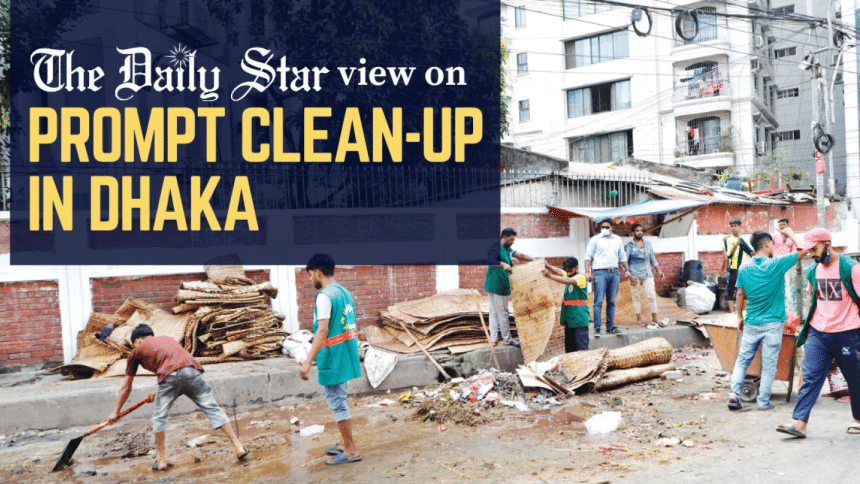Prompt clean-up of Dhaka proof that change is possible

It is good to see that the two city corporations of Dhaka have promptly cleaned up the garbage accumulated on roadsides following the sacrifice of animals during the Eid-ul-Azha. The two mayors deserve kudos as they have largely kept their promise of cleaning the city quickly. True to their words, since July 10, conservancy workers were seen diligently shovelling up waste onto corporation trucks. The residents also played their role well, which made it possible to get the clean-up done on time.
According to an estimate, Dhaka North City Corporation (DNCC) deployed about 10,000 conservancy workers and cleaned up 19,223 tonnes of animal and cattle market waste, with the mayor saying they had distributed 6.5 lakh garbage bags, 53 tonnes of bleaching powder, and 866 five-litre-sized containers of disinfectants among residents. On the other hand, Dhaka South City Corporation (DSCC) cleaned up 20,626.34 tonnes of waste in three days, with the help of around 9,950 conservancy workers. They distributed 28 tonnes of bleaching powder, 1.20 lakh garbage bags and 250 gallons of disinfectants.
It can be said that a good publicity campaign launched before the Eid by the city corporations has paid off. This was, after all, no small feat given that a huge percentage of the 99,50,763 cattle reportedly sacrificed across the country was in Dhaka – a task aided, in no small measure, by residents who took the initiative to ensure proper disposal of waste soon after the sacrifice. They kept their waste at designated places for the army of cleaners and trucks sent by the corporations to collect them without hassle.
But, like the proverbial gap between the cup and the lip, sacrificial waste could be seen even on the third day of Eid, emanating foul stench, in some areas. It would be difficult to convince the residents of those places of the good work done by the corporations in other parts of the city. Better coordination among the staff at various levels would have ensured that no area went unnoticed during the cleaning drive. However, when so many animals are sacrificed on a single day, the sheer amount of waste generated can be stupefying. Any mistake is thus understandable.
We would, therefore, like to thank the DNCC and DSCC staff and officials for undertaking such a successful operation. Hopefully, the spirit they have shown will be translated into undertaking the clean-up that this city of millions requires on a daily basis, as it slowly returns to normal activities.


 For all latest news, follow The Daily Star's Google News channel.
For all latest news, follow The Daily Star's Google News channel. 




Comments